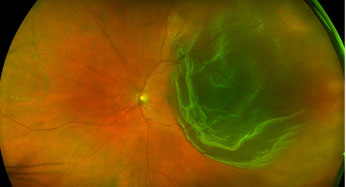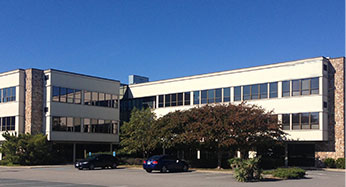Our retina specialists are board-certified ophthalmologists with advanced training in vitreoretinal surgery to diagnose and manage the full spectrum of diseases affecting the retina, macula, and vitreous.
Age Related Macular Degeneration
Age related macular degeneration (AMD) is the leading cause of severe vision loss in adults over the age of 60 in the United States. AMD is categorized into two types, "wet", or neovascular, and "dry", or atrophic.
Usually patients develop signs of dry macular degeneration first, which usually begins without any disturbance of your vision. At the time of diagnosis, it is possible you may already see distortion or spots in your vision. Its rate of progression is different for each individual, and in many people, may never cause loss of vision.
Because of AMD and other eye diseases, the American Academy of Ophthalmology recommends yearly eye exams for anyone over the age of 60.
What is Dry Macular Degeneration?
Dry macular degeneration is an eye disease that involves a portion of the retina known as the macula. The retina is the lights sensitive tissue that lines the inside of the eye. It is responsible for collecting the signal that is sent to your brain to be decoded into the image that you see.
The macula is a specific region of the retina that is critical for your central vision, and your ability to read and see faces. Symptoms of macular degeneration may include blurred, or distorted images, or difficulty reading.
In AMD, degenerative changes occur in the macula that result in the accumulation of cellular waste material within a layer known as Bruch's Membrane. As this waste material accumulates it disturbs the regeneration of cells and supply of nutrients causing the progression dry macular degeneration. The end result death of the overlying retinal pigment epithelium, and photoreceptors (light responsive cells in the retina).
What is Wet Macular degeneration?
Dry macular degeneration can progress to "Wet" AMD as Bruch's membrane is disrupted. This is a key structural layer in the eye that prevents abnormal interactions of choroid, one component of the rich blood supply in the eye, with the overlying retina. When there is a disruption in the barrier layer, blood vessels are then allowed to grow underneath the retina, where they tend to leak fluid and bleed, thus the term "Wet" AMD. The accumulation of fluid or blood can cause a rapid decline or loss of central vision that requires treatment with injectable medications. Despite the presence of these blood vessels and fluid, it is actually a superimposing of two degenerative processes, and so while there are medications that treat "Wet" AMD, the dry AMD can continue to cause slow degenerative changes to the retina over much longer periods of time.
Who gets AMD?
Non-modifiable risk factors include:
- family history of AMD,
- advanced age (over 50),
- Caucasian heritage,
- slightly more common in women.
Modifiable risk factors include:
- Smoking tobacco,
- increased sunlight exposure,
- heavy alcohol consumption,
- obesity,
- cardiovascular disease.
What can you do to reduce your risk of AMD or progression of existing AMD?
For all individuals, we recommend maintaining a healthy lifestyle, including avoiding smoking, limiting alcohol consumption to 1-2 drinks per day, exercise, and a well balanced diet that includes leafy green vegetables and oily fish such as Salmon.
For those individuals who already have macular degeneration, follow your eye doctor's recommendations for routine follow-up examination. Depending on the type of macular degeneration that you have, your doctor may recommend an over the counter vitamin supplementation often referred to as AREDS-2. Discuss with your eye doctor if this vitamin supplement is recommended for you.
Routine monitoring of your vision is recommended by checking one eye at a time. There are multiple methods for monitoring your vision that you should discuss with your eye doctor.
What are the treatments for AMD?
The treatment of "Wet" AMD was revolutionized in 2006 with the introduction of Anti-VEGF medication injections. Prior to this, the use of lasers was administered with a goal of preventing further vision loss, and in most cases resulted in central vision loss regardless.
Currently with Anti-VEGF medications being available with over 10 years of data, many individuals have been able to recover lost vision, and maintain their vision for long periods of time. Some people do continue to go on to lose further vision due to progression of the "dry" component of their disease, for which we don't currently have an effective treatment.
AREDS-2 vitamins are recommended to certain patients with "Dry" AMD, as studies have shown a 25% reduction over 5 years of the conversion from dry to wet AMD.At the Mandell Retina Center, we have available all current treatments, and are up to date on the most current research and ongoing trials of medications that may become available in the future. Please discuss any questions that you may have with your retina specialist.
Online Resources
- What Is Macular Degeneration? - American Academy of Ophthalmology
- Age-Related Macular Degeneration (AMD) Data and Statistics - National Eye Institute



